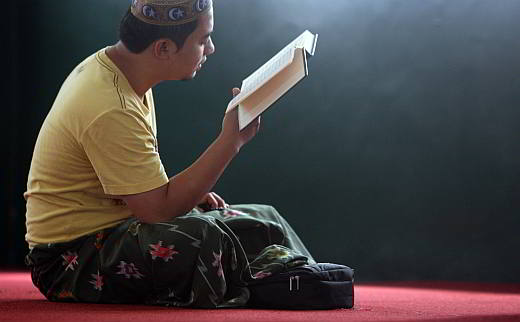Bishops urge discussion of Bangsamoro law

A Muslim believer starts his prayer at in Al Khariah mosque in Mambaling, Cebu City at the start of Ramadan in this July 2013 file photo.
(CDN FILE PHOTO)
Make sure no one is excluded in crafting the basic law creating the Bangsamoro.
The leader of the Catholic Church in the Philippines made this statement yesterday as he appealed to Congress to keep the door open to varying opinions as the legislature begins discussions on the proposed charter of the expanded autonomous region in Muslim Mindanao.
“Our Muslim brothers had one fervent wish: that the government make sure that with the establishment of the Bangsamoro, no one is excluded because of his or her religious belief, ethnicity s and sisters have found their way through various parts of the archipelago, settling in many provinces heretofore almost exclusively peopled by Christians. As far as we know, they have been welcomed, received and respected,” said Lingayen-Dagupan Archbishop Socrates Villegas, who signed a statement as president of the Catholic Bishops Conference of the Philippines.
The CBCP statement released yesterday said: “It is our hope that Christians too may receive hospitality in those parts of the one Republic that, by legislation, may be marked out as Bangsamoro”.
The House of Representatives last Wednesday held its first committee hearing on the proposed Bangsamoro Basic Law which would serve as the charter of the Bangsamoro region, an expanded autonomous region with broadened powers that is to replace the present Autonomous Region in Muslim Mindanao (ARMM).
The draft law embodies the terms of the peace agreement worked out by the Aquino administration and the previously secessionist Moro Islamic Liberation Front.
The CBCP appealed to members of Congress to study the Bangsamoro Basic Law “assiduously” and subject it to critical debate.
“Let those who have reservations to the proposal or even those who oppose it speak their minds freely, coherently and without reserve,” said Lingayen-Dagupan Archbishop Socrates Villagas, the current CBCP president.
LASTING PEACE
The CBCP promised to throw its support behind the government in its effort to achieve lasting peace in Mindanao.
“Many in Mindanao — and the government itself — pin their hopes on this latest attempt at what is hoped will be a definitive solution to the beautiful land of Mindanao that has, unfortunately, seen so much violence and has had so much of Filipino blood — Muslim and Christian alike — spilled on its soil!” Villegas said.
The CBCP head also implored the participation in the exchange and debate of the members of the indigenous cultural communities in Mindanao.
“It would violate the tenets of social justice to ignore them under the pretext of going by the desires of the majority,” he said.
The CBCP likewise acknowledged the need to keep country united on the issue of Bangsamoro despite the “variety of ethnicities, cultures, languages, and peoples.”
“The effort the government has taken to arrive at an agreement acceptable to all Filipinos underscores the premium that must be placed on the political and territorial integrity of the entire country,” he said.
The statement also commended the efforts of the peace panel and the representatives of Muslim Mindanao, both in the past and in the present administrations, who helped bring about the peace agreement.
But the responsibility now rests on the legislative branch of the government, the CBCP president said.
“The CBCP now urges the Legislature to do its part: To study the measure assiduously, to debate it vigorously and to place the interests of the nation and the vision of lasting, principled peace before every petty consideration and let those who advocate it argue as strenuously in its defense, for only in the context of intelligent — but charitable — discourse can we hope for a reasonable outcome and resolution,” Villegas said.
Villegas said “the painful conflicts” that have been troubling the Middle East should serve as lessons to the Philippine government.
“The lessons… should leave no doubt that, to be enduring and acceptable, any settlement, any organic act, any piece of constitutive legislation must be as inclusive as possible,” Villegas said.
INVOLVE EVERYONE
The CBCP head also implored the participation in the exchange and debate of the members of the indigenous cultural communities in Mindanao.
“It would violate the tenets of social justice to ignore them under the pretext of going by the desires of the majority,” he said.
The CBCP likewise acknowledged the need to keep country united on the issue of Bangsamoro despite the “variety of ethnicities, cultures, languages, and peoples.”
“The effort the government has taken to arrive at an agreement acceptable to all Filipinos underscores the premium that must be placed on the political and territorial integrity of the entire country,” he said.
Disclaimer: The comments uploaded on this site do not necessarily represent or reflect the views of management and owner of Cebudailynews. We reserve the right to exclude comments that we deem to be inconsistent with our editorial standards.
